
Groundbreaking Wastewater Testing Initiative in Guelph Spearheaded by University of Guelph
2024-12-12
Author: William
In a major advancement for public health in Guelph, researchers from the University of Guelph have partnered with Wellington-Dufferin-Guelph Public Health to enhance their wastewater monitoring program. This initiative aims to track the presence of COVID-19, influenza, and other infectious pathogens within the community, solidifying Guelph's role at the forefront of public health innovation.
Under the leadership of Dr. Lawrence Goodridge and Dr. Marc Habash, the research team will conduct comprehensive sampling and analysis of Guelph's wastewater three times a week. Dr. Goodridge, who holds the prestigious title of Canada Research Chair in Foodborne Pathogen Dynamics, and Dr. Habash, a distinguished professor in the School of Environmental Sciences, will be focusing on the detection of multiple viruses including COVID-19, respiratory syncytial virus (RSV), and even mpox.
The resulting data from this research will be shared with Wellington-Dufferin-Guelph Public Health, which will then display their findings on an accessible dashboard. This transparency in reporting is crucial for the local community to stay informed about potential health risks.
“We are glad to resume wastewater testing, which has proven incredibly effective and cost-efficient in monitoring seasonal viruses and spotting emerging threats,” commented Dr. Goodridge. Dr. Habash elaborated, stating, “Our campus facilities allow us to perform regular PCR testing on viruses found in the wastewater. We will also be doing genetic sequencing on selected samples to track any new or evolving viral strains.”
Notably, the U of G research team has secured extensive funding from the Natural Sciences and Engineering Research Council (NSERC) and the Canada Research Chair program. To bolster their wastewater surveillance efforts, they will also tap into the INSPIRE program, a $15 million initiative launched this year to enhance monitoring of infectious diseases.
Goodridge emphasized, “The data we collect will not only benefit WDG Health but will also be compiled for broader research publications, fostering a deeper understanding of public health dynamics.”
Having pioneered wastewater surveillance at their campus in the early pandemic stages, the University of Guelph helped set a precedent for such initiatives across Canada and emerged as leaders in Ontario. What began in 2020 as a means to gauge SARS-CoV-2 levels on campus has now expanded to encompass monitoring in Guelph, Orangeville, and the Niagara Region. This program serves as a critical indicator of community pathogen transmission.
Dr. Nicola Mercer, Medical Officer of Health and CEO of WDG Public Health, lauded the initiative, saying, “Wastewater surveillance has become an indispensable asset in protecting our region's health. Access to this information empowers everyone—from healthcare organizations to individuals—to evaluate risk and make informed health decisions.” She continued, praising the University of Guelph's leading role, “Their leadership is instrumental in making our community safer and healthier.”
With such robust efforts in wastewater testing, Guelph is not only taking proactive measures in managing public health but also setting an example for other regions to follow. Stay tuned for more developments as this pioneering collaboration unfolds!









 Brasil (PT)
Brasil (PT)
 Canada (EN)
Canada (EN)
 Chile (ES)
Chile (ES)
 España (ES)
España (ES)
 France (FR)
France (FR)
 Hong Kong (EN)
Hong Kong (EN)
 Italia (IT)
Italia (IT)
 日本 (JA)
日本 (JA)
 Magyarország (HU)
Magyarország (HU)
 Norge (NO)
Norge (NO)
 Polska (PL)
Polska (PL)
 Schweiz (DE)
Schweiz (DE)
 Singapore (EN)
Singapore (EN)
 Sverige (SV)
Sverige (SV)
 Suomi (FI)
Suomi (FI)
 Türkiye (TR)
Türkiye (TR)